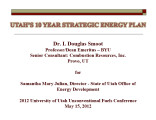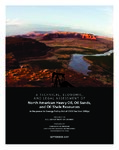TO
1 - 25 of 12
| Title | Date | Subject | Description | ||
|---|---|---|---|---|---|
| 1 |
 |
Policy analysis of the Canadian oil sands experience | 2011-03-10 | policy analysis; Canadian oil sands experience; oil sands; federal oil sands resources; oil sands development; unconventional fuels | The presentation goes over analyzing the relevance of the Canadian experience to U. S. oil sands development. This report focuses on federal oil sands resources, specifically potential development in the STSA's. No Current development on federal lands, despite leasing authorization under the Combine... |
| 2 |
 |
Utah's 10 Year Energy Plan | 2012-05-15 | Governor Gary R. Herbert; energy initiatives; strategic energy plan; energy development; responsible energy resource development | Presentation given at the 2012 Unconventional Fuels Conference, on May 15. |
| 3 |
 |
Federal control of greenhouse gas emissions | 2010-04-28 | greenhouse gas emissions; federal control efforts; domestic legislation | Federal Control Efforts: 1) International 2) New Domestic Legislation 3) Using Existing Domestic Legislation |
| 4 |
 |
Wild lands and wilderness - Implications for Utah's unconventional fuels industry | 2011-05-17 | unconventional fuels industry; order 3310; maintain wilderness resource inventories; BLM; FLPMA; land management | Presentation given at the 2011 Unconventional Fuels Conference. |
| 5 |
 |
Land and resource management issues relevant to deploying in-situ thermal technologies: Topical Report: October 1, 2009 to December 31, 2010 | 2011-01 | in-situ; oil shale; domestic energy source; oil sands | Utah is home to oil shale resources containing roughly 1.3 trillion barrels of oil equivalent and our nation's richest oil sands resources. If economically feasible and environmentally responsible means of tapping these resources can be developed, these resources could provide a safe and stable dome... |
| 6 |
 |
Lands with wilderness characteristics, Resource Management Plan constraints, and land exchanges: Cross-jurisdictional management and impacts on unconventional fuel development in Utah's Uinta Basin | 2012-03 | Utah oil shale; oil sands; unconventional fuel resources; land exchanges; land rights | Utah is rich in oil shale and oil sands resources. Chief among the challenges facing prospective unconventional fuel developers is the ability to access these resources. Access is heavily dependent upon land ownership and applicable management requirements. Understanding constraints on resource acce... |
| 7 |
 |
Policy analysis of produced water issues associated with in-situ thermal technologies: Topical report: October 1, 2009 to December 31, 2010 | 2011-01 | topical report; produced water issues; in situ thermal technologies; oil shale/sands; water rights; domestic energy source | Commercial scale oil shale and oil sands development will require water, the amount of which will depend on the technologies adopted and the scale of development that occurs. Water in oil shale and oil sands country is already in scarce supply, and because of the arid nature of the region and limita... |
| 8 |
 |
Policy issues associated with using simulation to assess environmental impacts | 2014-11 | oil and natural gas technology; policy issues with using simulation; environmental impacts; simulation-based science; judicial assessments and models; environmental policymaking | This report examines the relationship between simulation-based science and judicial assessments of simulations or models supporting evaluations of environmental harms or risks, considering both how it exists currently and how it might be shaped in the future. This report considers the legal standard... |
| 9 |
 |
Clean and secure energy from domestic oil shale and oil sands resources: Quarterly progress report: October 2009 to December 2009 | 2010-02-03 | ICSE; Clean and Secure Energy program; CASE; Itasca Group; Red Leaf Resources; Enshale's; Vernal, Utah; oxy-fuel; CO2 capture; Oil shale; Oil sands; Crude oil; CO2 emissions; International Flame Research Foundation; Pyrolysis; Lattice Boltzmann; Kerogen; Oil recovery simulation; TGA; Dry shale; Pyro... | The Clean and Secure Energy from Domestic Oil Shale and Oil Sands Resources program is part of the research agenda of the Institute for Clean and Secure Energy (ICSE) at the University of Utah. The program was officially launched on October 1, 2009. The project management plan was submitted for revi... |
| 10 |
 |
Policy analysis of water availability and use issues for domestic oil shale and oil sands development: Topical Report: October 1, 2009 to March 31, 2010 | 2010-03 | oil shale/sands resources; energy source; unconventional fuels; water demands; water availability; domestic oil shale/sands development; topical report | Oil shale and oil sands resources located within the intermountain west represent a vast, and as of yet, commercially untapped source of energy. Development will require water, and demand for scarce water resources stands at the front of a long list of barriers to commercialization. Water requiremen... |
| 11 |
 |
Clean and secure energy from domestic oil shale and oil sands resources: Quarterly progress report - April 2013-June 2013 | 2013 | domestic oil sands; domestic oil shale; ICSE; unconventional fuels development; life-cycle analysis | The Clean and Secure Energy from Domestic Oil Shale and Oil Sands Resources program, part of the research agenda of the Institute for Clean and Secure Energy (ICSE) at the University of Utah, is focused on engineering, scientific, and legal research surrounding the development of these resources in ... |
| 12 |
 |
A technical, economic, and legal assessment of North American heavy oil, oil sands, and oil shale resources: In response to Energy Policy Act of 2005 Section 369(p) | 2007-09 | Oil sands; Oil shale; Heavy oil; Energy Policy Act; 2005; Climate Change; Petroleum; Oil Cost; United States; North American heavy oil; Utah Heavy Oil Program; UHOP; World economic development; Energy; Canadian oil sands; Unconventional resources ;Technical; Economic; Legal assessment | Against the backdrop of world population growth, rapid economic expansion in the world's most populous countries, challenging political climates in many oil-producing nations, and the specter of climate change, worldwide energy consumption is projected to increase from the 2004 level of just over 40... |
1 - 25 of 12
